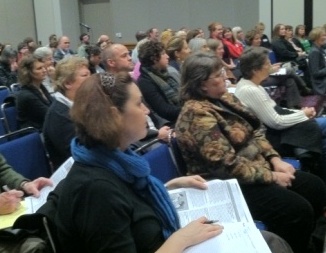 Foster parents, family members of children in foster care, and child welfare professionals were among the large crowd who attended the Shoulder to Shoulder Conference at the Oregon Convention Center. Pictured here is the audience at the Families in the Foster Care System breakout session. Foster parents, family members of children in foster care, and child welfare professionals were among the large crowd who attended the Shoulder to Shoulder Conference at the Oregon Convention Center. Pictured here is the audience at the Families in the Foster Care System breakout session. |
At the 13th Annual "Shoulder to Shoulder" child welfare conference, Carrie Medina filed a missing report. Medina wasn't reporting a lost child. She was drawing attention to a hole she sees in our child welfare system: a hole that causes families to lose children, and children to lose families.
"I think there is still a big piece missing in the system regarding support for biological families," said Medina, a foster mom for more than 20 years. "We still treat biological families as the devil.
"If we can invest more of our resources in biological parents and foster parents we'll be better off in the long run."
Medina was a panelist for Families in the Foster Care System, moderated by Allison Frost of OPB. Also on the panel were Judge Nan Waller; Katherine Cahn, who heads the Child Welfare Partnership at Portland State University; and Charity Briggs, a former foster child who ended up losing her own child to foster care for a short time. Briggs now works as a parent mentor for moms with children in foster care.
The panel agreed that the biggest barrier to keeping children with their birth families is that few resources have been targeted to helping those families. In part that's because federal law puts no cap on the money that states can spend on putting children into foster care. Yet there is no dedicated funding to help birth families parent successfully. And welfare systems have often worked against birth families
"If your only tool is a hammer, everything looks like a nail," Cahn said. "Our child welfare system is designed around physical and sexual abuse, but most of our cases are about neglect. And there is a deep correlation between poverty and neglect."
Poverty and Bias Keep More Children of Color Trapped in the System
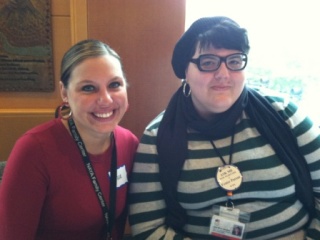 Eva Williams (L) and Alise Sanchez attended the conference from NAYA, the Native American Youth and Family Center Eva Williams (L) and Alise Sanchez attended the conference from NAYA, the Native American Youth and Family Center |
Child welfare interventions are necessary to prevent abuse and neglect. In Oregon 22 children were killed by family members in 2010. Yet data shows that putting children in foster care often fails to stop the cycle of abuse. Frequent moves, failed placements, broken family attachments and abuse within the system can traumatize children further, according to outcome studies by the Annie E. Casey Foundation.
Children of color suffer disproportionately. Higher rates of African American and Native American children go into foster care. They also stay longer. Efforts are underway to keep more children with their biological families, but the figures remain daunting, with Portland's Native American children and African American children hit hardest. A state task force on the issue that reported this year says:
"About 20 percent of all children in foster care during the study period were children of color, despite the fact that children of color make up only 11 percent of Oregon's general child population. American Indian/Alaskan Native children were more than five times more likely, and African American children two times more likely, to be represented in Oregon's foster care population than in Oregon's general population."
 Katherine Cahn Katherine Cahn |
Cahn said three factors contribute to the disproportionate numbers of children of color in care: individual bias; institutional bias and poverty. Nationally, children's advocates want to change child welfare policies and provide more support to birth families.
"Our families need housing, jobs, and access to drug treatment, mental health counseling, food and transportation," she said. "Too many of our children and mothers don't get the help they need. And we know there are too much untreated trauma, untreated mental illness and untreated substance abuse."
The state task force on the issue and a 2011 Multnomah County workgroup report both set targets and outlined plans for reducing those numbers.
Cahn noted that nationally adocates are pushing for welfare systems to treat parents who have crack convictions in the same way as parents who have abused cocaine. Famously, Black Americans have been charged and labeled as felons for crack abuse, when cocaine abusers, more likely to be White, have received lesser penalties. The result? Black family members with a history of crack abuse have been denied opportunities to regain custody.
A Foster Kid Struggles to Keep Her Own Daughter
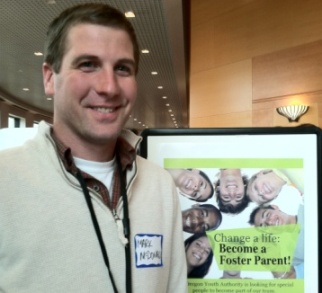 Mark McDonald is looking for a few good families to foster youth leaving the juvenile justice system. "They need everything a regular kid needs but just a little more supervision," he says. If you are up for the job call him at 503-731-4993 Mark McDonald is looking for a few good families to foster youth leaving the juvenile justice system. "They need everything a regular kid needs but just a little more supervision," he says. If you are up for the job call him at 503-731-4993 |
Briggs told how she went into foster care when she was 8 years old because her father was in prison and her mother was a meth and later a heroin addict. After watching a television program about HIV and AIDS, Briggs told her mother that her grandmother's partner was sexually abusing her. Child welfare got involved and Briggs was placed in foster care. An untreated addict, her mother never regained custody. Briggs was placed in home after home, but did not attach to her foster families and often ran away.
Angry and depressed, at age 13 she tried methamphetamine, which eventually turned into a 17-year habit. She says she did better for a while in high school, but eventually ran from that foster home too. When she did form an attachment it was to a boyfriend who also had substance abuse problems. She managed to stay clean through her pregnancy, but soon relapsed.
"I had basically turned into my mom," she said.
When her own child was taken into foster care two years later, however, Briggs chose a different path. She quit drugs for good. After 30 days clean she was given a second chance to be a good parent. But it wasn't easy, she says. Her child was angry – a result of the neglect suffered when Briggs was using meth. And she didn't know how to cope, let alone do it without the crutch of drugs.
"I thought about putting her back in foster care," Briggs admits. "I asked myself, 'Do I have the ability to handle this?'"
She managed to get housing and enough resources to care for her daughter. And Parents Anonymous helped, she says. Today, Briggs is raising a bright, happy five-year-old who loves reading and math. Yet her story shows how easily foster children repeat patterns that keep families in the system.
A Foster Mom Fights to Keep Birth Families Together
Medina's story also spanned generations – three generations of one family. A foster mom for more than 20 years, Medina has fought to keep her foster kids connected to their birth families. She has fostered nine who are now adults, all working and contributing. But she also has seen how foster care fails children.
Medina saw three generations of the same family repeat patterns of abuse, addiction and neglect. She was fostering a girl and the mother, who knew DHS were not going to return her daughter, asked Medina to adopt her so at least she could stay in contact.
"The state was not thrilled," Medina said. "They said her parental rights were terminated and the mother had no right to see the child. I was coming from a perspective that said 'Show me the paper where the child's rights are terminated.' This particular child needed to have …contact with her mother to begin healing.
"I could totally see her at 14 years old and pregnant, and I knew a big part of preventing that was for that little girl to have contact with her mother."
Medina did adopt that child who has now grown up and is doing well. But her daughter's cousins, who also were placed in foster care, had a different outcome.
"They had more mothers than I can count," she says.
The girls spent their childhood in foster homes and had no contact with their biological family. During their teens, their lives were overtaken by substance abuse and turbulent relationships. Soon they too had children who also were removed and taken into care.
Now Medina is fostering a two-year-old boy, born to her daughter's cousin. His mom, grandma and aunts care about him and call him, even though they can't parent him at this time, she says. Medina believes that he should have the right to maintain those relationships.
"He needs to know his mom is happy and successful," she says. "If not, see whose car he's breaking into when he's 17 and he's an angry young man who didn't get his needs met."
A Judge Looks For Ways to Help Birth Parents Succeed
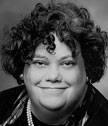 Judge Nan Waller Judge Nan Waller |
Judge Waller said she has been adjudicating child welfare cases for long enough to have seen how the system fails children.
"There are families that I am on my third generation, and that makes me ill," she said. "People need a sense of attachment. Even if we can't get them home, everyone needs somebody and it is that power of attachment that will break the cycle.
"For most children, if we can safely keep them at home with the right supports in place, it's far better for the child."
In the past, Waller said, parents were handed a list of tasks to complete in order to have a chance of getting their children back. Typically, a parent might be told they must get a job, have housing with enough space for the children, complete substance abuse treatment and so on… Yet parents were not given help to get into adequate housing, or treatment programs – let alone land and keep a job while they were doing so.
"It's a Catch 22," she said. "We need individual plans, and we need to empower the people who come before us.
"These are people who have faced tremendous trauma and there are barriers we don't see with our eyes."
A Father Helps Other Fathers Become Good Parents
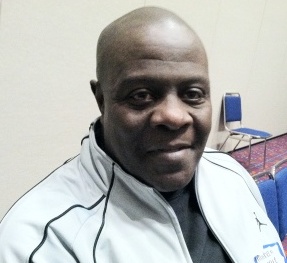 Marvin Barber helps men working to become good parents. He says resources for fathers are meager. Marvin Barber helps men working to become good parents. He says resources for fathers are meager. |
Marvin Barber a conference attendee, lost a child in the foster care system several years ago. When his daughter was placed in foster care, he says he immediately cleaned up and dealt with his problems. But his effort went unrecognized in a system that often sidelines fathers.
Barber says he has kept all the court records, so that one day, if his daughter finds him, he can show her he tried his best to keep her. He worries every day that she is being abused or hurt, he says.
"I wish all judges were like Judge Nan (Waller)," he says. "I know if I'd had a judge like that I would have been able to keep my daughter. She's really supportive of families and of keeping the family together."
Now working as a parent mentor with Morrison Child and Family Services, Barber says he still sees impossible lists handed out to fathers. It's very difficult for fathers to get housing with space for their children, and while mothers sometimes can go into treatment with their children, that's not the case for fathers.
"If there's 20 things to help a mother, there is only one for a father," he said. "Things are changing, but from a male point of view there needs to be more resources. There are just not enough doors opening for fathers. That is a big barrier."
MORE: The Skanner News followed the story of Carollyn Smith a grandmother who fought unsuccessfully for custody of two of her daughter's children even though she is caring for their five siblings.
Parents Anonymous offers support groups for parents Call 503-258-4557 ) )
EVENT: Trail of Tears Rally, dinner and Motown dance jam to support families seeking to regain custody of relatives: 4p.m. to 2:30 a.m Nov. 20 at The Grand Cafe, 832 SE Grand Ave. Menu includes catfish, hush puppies and coleslaw. More information from Katie at 503-984-6733 or Evelyn 503-875-9200






















































































































































































































































































































